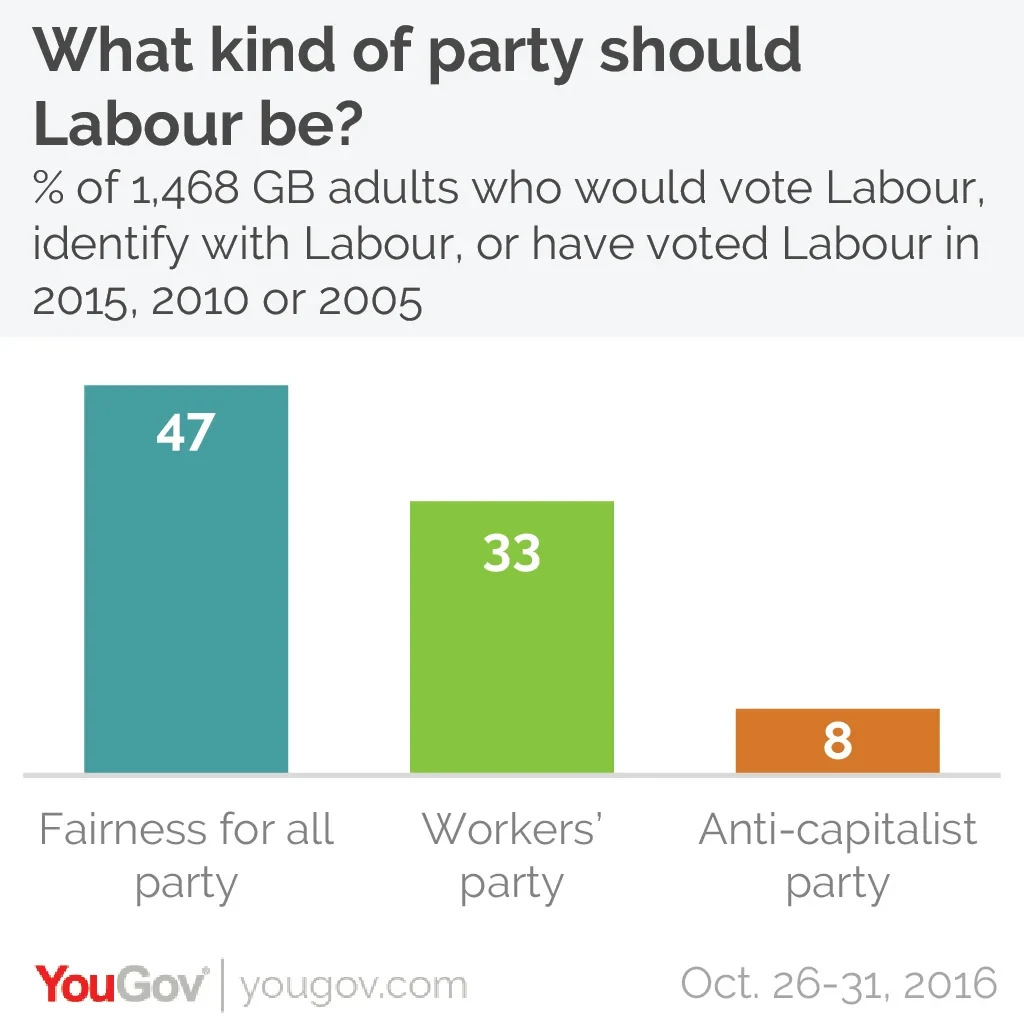Labour seems to be losing touch with those who want it to be a working class party
Labour are a divided party. I'm not talking about the division we normally discuss, that between Jeremy Corbyn's supporters and opponents, but a much deeper division within their base of support, the gap between more middle class Labour voters with more socially liberal attitudes, and those with a more traditionally working class, socially conservative viewpoint.
While we talk about this being a class divide, it's not as simple as that - it's more about different attitudes. To try and get a handle on it we polled what I think of as the 'Labour family': not just current Labour voters, but anyone voting Labour now, identifying with Labour, or having voted Labour in any of the last three elections - trying to cover all those people Labour has, does or might appeal to.
We asked people who identified with Labour in one of these ways what they thought the purpose of the Labour party SHOULD be these days, offering them the choice of a party conspicuously aimed at building a fair society for all, a party aimed at helping and representing ordinary working class people and a further left option of a party aimed at getting rid of the capitalist system and replacing it with something fairer. None of these aims necessarily contradict the others of course (Labour could do all three of these things!) it is more a question of emphasis and language, about what people expect the purpose of a Labour party to be. Should it be a party for the workers? A liberal party of equality and fairness? A party to overthrow the capitalist system?

Only 8% of the Labour family said they thought Labour's main purpose should be to get rid of capitalism. This smallest group was by far the most likely to be currently voting Labour and to support Jeremy Corbyn's leadership, and were most likely to think that Labour was representing people like them. The more interesting contrasts though were between the two larger groups - the 47% who thought Labour should be a party with a mission defined by fairness for all, and the 33% who thought Labour should be a party with a mission aimed at ordinary working class people.
Breaking down people's answers to other questions, it becomes clear there is a huge contrast between the attitudes of these two groups:
- Among people who want a Labour party for the workers, 63% think immigration has a bad effect on the country whilst only 28% say it has a positive effect. Among people who want a Labour party aimed at fairness for all those numbers are reversed: 62% have a positive opinion of the effect of immigration and 29% a negative one.
- Asking about human rights laws, among those who want a workers party 48% think they are negative thing and only 37% a positive thing. Amongst "fairness for all" Labour, 66% think they are positive, only 21% a negative.
- When we asked about welfare benefits, among those who want a Labour party for the workers 47% think benefits are too easy to get and go to those who don't need them, only 31% think they should be easier to get. Among those who want "fairness for all" 42% think they should be easier to get, only 28% think they are too easy.
- In the EU referendum "fairness for all" Labour was overwhelmingly pro-EU, by 66% to 23%. "Workers' party" Labour backed Brexit by 50% to 36%.
While it doesn't explain it all, there is a class element here (AB Labour people are more likely to back a party aimed at "fairness for all" than a workers party by 59% to 27%, people in social classes DE are more likely to want a "workers' party" by 39% to 36%. There are also differences in educational achievement and political sophistication - 42% of "fairness for all" Labour have degrees, only 23% of "workers' party" Labour do. A third of "fairness for all" Labour read a broadsheet newspaper, but only 13% of "workers' party" Labour do. "Workers' party" Labour are also less ideological, or at least think less in ideological terms - only 36% put themselves as being left of centre, with 30% saying don't know. In comparison 61% of "fairness for all" Labour describe themselves as left of centre.
No doubt there will be many other areas where "fairness" Labour and "workers'" Labour agree, but on these sort of cultural issues there is also a complete contrast, and no easy or obvious way that Labour can keep both sides happy. Right now Labour seem to be doing better at keeping "fairness" Labour onside. At the 2015 election, only 51% of those who think Labour should be a workers party voted for them, compared to 62% of those who wanted a party defined by fairness. On current voting intentions those figures have dropped to 44% and 52%.
It's long been said that Labour are losing touch with their working class voters. They also seem to be losing touch with those who want to see a working class Labour party.
Photo: PA









